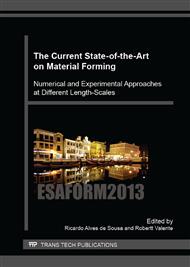[1]
H. Aretz, F. Barlat: General Orthotropic Yield Functions Based on Linear Stress Deviator Transformations, Proc. 8th International Conference on Numerical Methods in Industrial Forming Processes - NUMIFORM 2004, edited by S. Ghosh, J.K. Lee and J.C. Castro, AIP Conf. Proc. 712, pp.147-156 (2004)
DOI: 10.1063/1.1766515
Google Scholar
[2]
H. Aretz: A less hypothetical perspective on rate-independent continuum theory of metal plasticity, Mechanics Research Communications 33 (2006) 734-738
DOI: 10.1016/j.mechrescom.2006.01.006
Google Scholar
[3]
H. Aretz: Numerical analysis of diffuse and localized necking in orthotropic sheet metals, International Journal of Plasticity 23 (2007) 798-840
DOI: 10.1016/j.ijplas.2006.07.005
Google Scholar
[4]
H. Aretz: A consistent plasticity theory of incompressible and hydrostatic pressure sensitive metals, Mechanics Research Communications 34 (2007) 344-351
DOI: 10.1016/j.mechrescom.2007.01.002
Google Scholar
[5]
H. Aretz: A simple isotropic-distortional hardening model and its application in elastic-plastic analysis of localized necking in orthotropic sheet metals, International Journal of Plasticity 24 (2008) 1457-1480
DOI: 10.1016/j.ijplas.2007.10.002
Google Scholar
[6]
H. Aretz: An extension of Hill's localized necking model, International Journal of Engineering Science 48 (2010) 312-331
DOI: 10.1016/j.ijengsci.2009.09.007
Google Scholar
[7]
H. Aretz, J. Aegerter, O. Engler: Analysis of earing in deep drawn cups, Proc. 10th International Conference on Numerical Methods in Industrial Forming Processes - NUMIFORM 2010, edited by F. Barlat, Y. H. Moon and M. G. Lee, AIP Conf. Proc. 1252, pp.417-424 (2010)
DOI: 10.1063/1.3457585
Google Scholar
[8]
H. Aretz, S. Keller, R. Vogt, O. Engler: Modelling of ductile failure in aluminium sheet forming simulation, International Journal of Material Forming 4 (2011) 163-182
DOI: 10.1007/s12289-010-1021-8
Google Scholar
[9]
H. Aretz, S. Keller: On the non-balanced biaxial stress state in bulge-testing, Steel Research International 2011 Special Edition, pp.738-743 (2011)
Google Scholar
[10]
H. Aretz, F. Barlat: Unconditionally convex yield functions for sheet metal forming based on linear stress deviator transformation, Key Engineering Materials 504-506 (2012) 667-672
DOI: 10.4028/www.scientific.net/kem.504-506.667
Google Scholar
[11]
R. Arrieux: Determination and use of the forming limit stress diagrams in sheet metal forming, Journal of Materials Processing Technology 53 (1995) 47-56
DOI: 10.1016/0924-0136(95)01960-m
Google Scholar
[12]
F. Barlat, H. Aretz, J.W. Yoon, M.E. Karabin, J.C. Brem, R.E. Dick: Linear transfomation-based anisotropic yield functions, International Journal of Plasticity 21 (2005) 1009-1039
DOI: 10.1016/j.ijplas.2004.06.004
Google Scholar
[13]
A. Graf, W. Hosford: The influence of strain-path changes on forming limit diagrams of Al 6111 T4, International Journal of Mechanical Sciences 36 (1994) 897-910[14] W.F. Hosford, R.M. Caddell: Metal Forming -- Mechanics and Metallurgy, 2nd edition, Prentice Hall, (1993)
DOI: 10.1016/0020-7403(94)90053-1
Google Scholar
[15]
L.M. Kachanov: Fundamentals of the Theory of Plasticity, Dover Publications, (2004)
Google Scholar
[16]
S. Keller, W. Hotz, H. Friebe: Yield curve determination using the bulge test combined with optical measurement, Proc. International Conference of the International Deep Drawing Research Group (IDDRG), Golden, CO, USA (2009)
Google Scholar
[17]
R.A. Lebensohn, C.N. Tomé: A self-consistent anisotropic approach for the simulation of plastic deformation and texture development of polycrystals: application to zirconium alloys, Acta Metall. Mater. 41 (1993) 2611-2624
DOI: 10.1016/0956-7151(93)90130-k
Google Scholar
[18]
R.A. Lingbeek, T. Meinders, A. Rietman: Tool and blank interaction in the cross-die forming process, In: Proc. 11th ESAFORM Conference on Material Forming, 23-25 April 2008, Lyon, France, (2008)
DOI: 10.1007/s12289-008-0016-1
Google Scholar
[19]
J.C. Simo, T.J.R. Hughes: Computational Inelasticity, Springer-Verlag, (1998)
Google Scholar
[20]
T.B. Stoughton: A general forming limit criterion for sheet metal forming, International Journal of Mechanical Sciences 42 (2000) 1-27
DOI: 10.1016/s0020-7403(98)00113-1
Google Scholar
[21]
K. Yoshida, T. Kuwabara, M. Kuroda: Path-dependence of the forming limit stresses in a sheet metal, International Journal of Plasticity 23 (2007) 361-384
DOI: 10.1016/j.ijplas.2006.05.005
Google Scholar
[22]
K. Yoshida, N. Suzuki: Forming limit stresses predicted by phenomenological plasticity theories with anisotropic work-hardening behavior, International Journal of Plasticity 24 (2008) 118-139
DOI: 10.1016/j.ijplas.2007.02.008
Google Scholar


